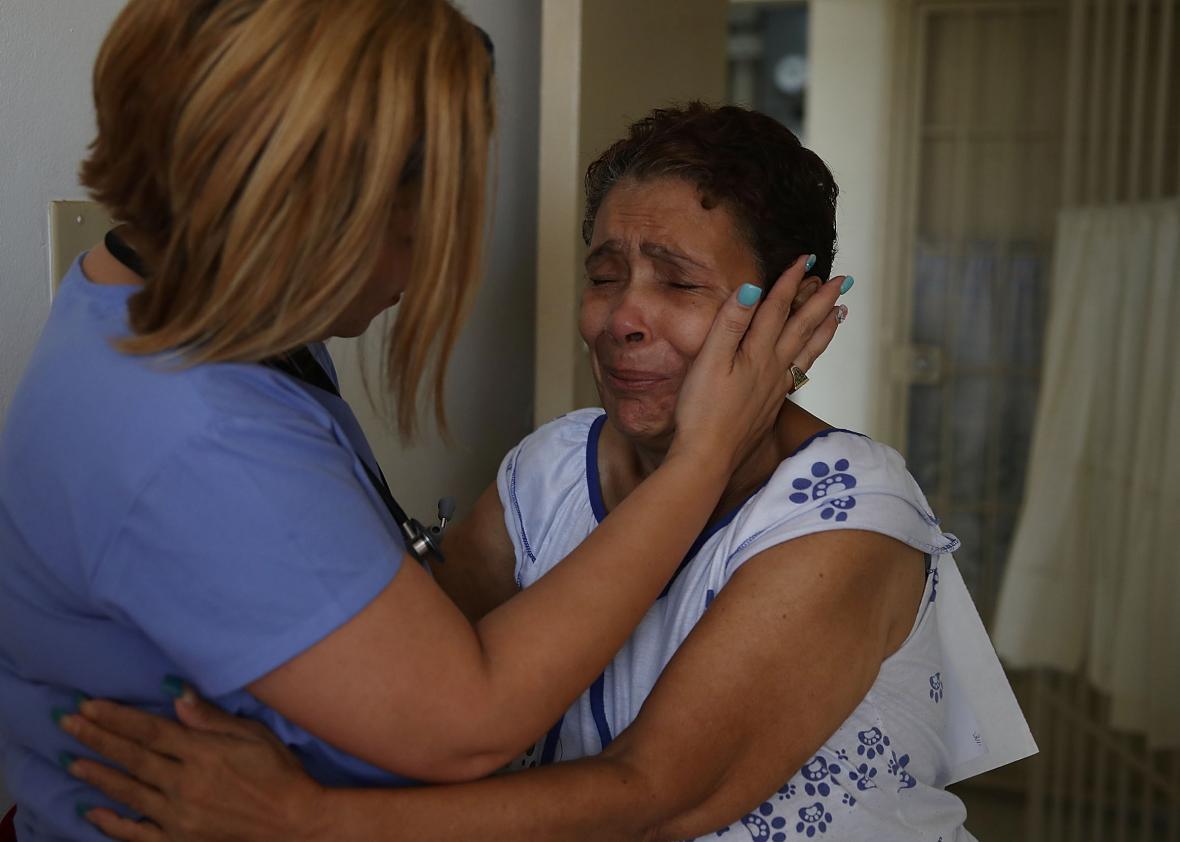Since his inauguration in January, President Trump has lurched from scandal to scandal, crisis to crisis. And nearly all have been entirely self-inflicted. Make Trump a little less impulsive, a little more slow to take offense, and a little more interested in the details of governance, and he likely wouldn’t have an escalating confrontation with North Korean leader Kim Jong-un or the independent FBI investigation that threatens to engulf his administration.
Hurricane Maria and its devastating hit on Puerto Rico constitutes the first independent crisis of Trump’s tenure—the first event with major consequences for his presidency but out of his immediate control. And what does crisis management look like for President Trump under these circumstances? The same as it does with his self-inflicted wounds: reactive, chaotic, and tinged with demagoguery.
Conditions in Puerto Rico are dire. The storm destroyed crops, key transportation hubs, the electrical grid, and vital communications infrastructure across the island. Millions lack power and access to clean drinking water. There’s also an impending health crisis, with hospitals either running on generators or not running at all. Thus far, the official death toll stands at just 16 lives, but experts believe that number will rise and could reach the hundreds.
The federal government couldn’t prevent this disaster. But it could have prepared Puerto Rico for the worst by having supplies and resources ready for immediate deployment. That didn’t happen, and the White House is to blame. As Maria approached the island, President Trump was indifferent to the impending crisis, rallying with Alabama Republicans, touting his newest travel ban, and blasting professional football players for their protest against police brutality. On Puerto Rico, however, Trump was silent. To the extent that he spoke publicly, it was to blame its government for the island’s predicament. “Texas & Florida are doing great but Puerto Rico, which was already suffering from broken infrastructure & massive debt, is in deep trouble,” he said last Monday on Twitter, when the extent of the disaster was clear.
A Washington Post report reveals that the White House had largely dropped the ball, turning its attention from the hurricane as it landed, then fumbling the response. For example, it took a week for Trump to waive a law that barred foreign vessels from delivering aid to Puerto Rico.
When confronted with this inactivity, bordering on indifference, President Trump again used Puerto Rico’s government as a scapegoat for the slow pace of recovery. “Ultimately the government of Puerto Rico will have to work with us to determine how this massive rebuilding effort … will be funded and organized, and what we will do with the tremendous amount of existing debt already on the island,” he said during a Friday speech on tax policy, before traveling to his golf club in Bedminster, New Jersey.
Trump’s only extended comments on the disaster were to attack the mayor San Juan, who had criticized the administration for trying to spin the situation on Puerto Rico. Responding to a comment from acting Homeland Security Secretary Elaine Duke, who said the federal government’s efforts were a “good news story,” Mayor Yulín Cruz told CNN that “this is not a ‘good news story.’ This is a ‘people are dying’ story. It’s a life-or-death story.”
Trump responded Saturday morning in typical form. “The Mayor of San Juan, who was very complimentary only a few days ago, has now been told by the Democrats that you must be nasty to Trump,” he said on Twitter. “Such poor leadership ability by the Mayor of San Juan, and others in Puerto Rico, who are not able to get their workers to help.” Then he did something he had never done when discussing hurricane damage in Texas and Florida: He blasted Puerto Ricans themselves. “They want everything to be done for them when it should be a community effort. 10,000 Federal workers now on Island doing a fantastic job.”
It was an extraordinary set of attacks, soaked in the racial demagoguery—they want everything to be done for them—that has defined his time in national politics. It’s tempting to call Trump’s behavior a deliberate distraction from his botched response to the storm. But that would assume too much in the way of strategic thinking. Trump is impulsive and easily piqued, especially when criticized by women or nonwhites. It’s why he lashed out at Khizr Khan and his family during the presidential election, or why he reaches for gendered insults when addressing female critics (“nasty”). Far from a diversion, this performance is a manifestation of Trump’s racism and sexism. It’s simply what he does.
All of this leaves the American citizens of Puerto Rico with a president who seems to hold their island in a racialized contempt not unlike that of a colonial overseer, preoccupied with the productivity of the people (“debt”) and uninterested in their lives. And that, in turn, is a stark reminder of Puerto Rico’s status as a territory, and the sub-citizenship that status implies for its residents.
As for those of us who live in states, we are reminded of a central truth of this administration: The president is unable or unwilling to do what the office requires, substantively or symbolically. He turns to demagoguery when faced with criticism, and he defines deservingness on racist and exclusionary terms. And that last part is key. Donald Trump campaigned on bringing government to bear against nonwhites and other disfavored groups, in order to redistribute the nation’s resources to their rightful (white) owners.
In that context, Donald Trump’s indifference to Puerto Rico isn’t a mistake or an error: It’s fulfilling a promise. And even if the island has many people who identify as white, its association with the Spanish-speaking regions of the Americas marks it and its people as “other” in the eyes of the president. They are, in other words, precisely the kinds of people Trump said he would neglect, and here he is now, neglecting them.
